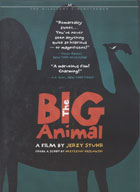
The Big Animal 200?
Distributed by Milestone Films & Video, PO Box 128, Harrington Park, NJ 07640-0128; 800-603-1104
Produced by Telewizja Polska
Directed by Jerzy Stuhr
DVD, b&, 72 min.
Jr. High - Adult
Film Studies, Humor, Multicultural Studies
Date Entered: 10/27/2006
Reviewed by Susanne Boatright, Library, Blue River Community College, one of the Metropolitan Community Colleges, Kansas City, MOA Bactrian camel, abandoned by the circus in a small town in Poland, finds its way to the front gate of Zygmunt and Marysia Sawicki one evening during dinner. Zygmunt is delighted with the camel and parades him through town on a leash. Although the townspeople initially share Zygmunt’s feeling that the camel is a wonderful and mysterious and altogether delightful beast, they soon grow jealous of Zygmunt’s “ownership” of the animal and try to force him to give it up.
This film is directed by Jerry Stuhr, who also plays Zygmunt Zawicki. Stuhr himself is quoted as saying that this film is a metaphor about the intolerance of society for those who appear to be different and many reviewers have written about it on that basis. On a deeper level however, this film is a parable about what happens when you try to possess that which gives joy.
The townspeople are initially as delighted with Zygmunt’s camel as he is. They try to take pictures of him, to pet him, to ride him. But Zygmunt is protective of his new friend and will not let anyone show him attention. The town photographer wants to use the camel as a way to drum up business, but Zygmunt says that he does not want to make a profit from the beast. And eventually the townspeople turn against them. Zygmunt is snubbed by his friends and professional acquaintances, parents take their children out of the school run by Marysia, the conductor of the town orchestra says that Zygmunt is playing out of tune and the Zawickis are asked to pay a livestock tax for horses, since nothing for camels exists on the books.
The camel, says a town leader, is “useless to the community.” And so it is. But, more to the point, the camel has not been allowed to become part of the community. The Zawickis build a fancy shed that resembles a mosque for their camel and are accused by the envious workers that construct it of conspicuous consumption.
Finally the camel disappears one night. All that is left of him is a broken bridle. Now that the townspeople are not reminded daily of what they cannot have, they treat Zygmunt and Marysia as before, even congratulating them on their moral stamina.
Zygmunt is sad however and misses the big animal. He visits a festival in the city center and a child quietly shows him a little plastic toy camel he has hidden in his jacket. Ownership of the camel has passed on. The last scene shows Zygmunt and Marysia at the Warsaw zoo, nuzzling the camels. Their faces are radiant with happiness once more.
The movie was filmed in Poland and is in Polish, with English subtitles. The elegance of the cinematography by Academy Award nominee Pawel Edelman (The Pianist) perfectly complements the simple narrative. The leading roles are filled by Jerzy Stuhr (also the director and a close personal friend of the late Krzystof Kieslowski, who wrote the screenplay) as Zygmunt and Anna Dymna as Marysia. But it is Rubio the Camel who steals the show! This is a lyrical, allegorical, simply wonderful film, highly recommended for all ages and venues. Bonus features of the DVD include Controlled Testimonies (a 31 minute interview with Jerzy Stuhr), Rendezvous on the set of The Big Animal, and a theatrical trailer.
Awards
- Karlovy Vary International Film Festival, Award of Ecumenical Jury
- Polish Film Festival, Best Score
- Wiesbaden goEast, Golden Lily
- AFI Fest, Grand Jury Prize nominee
- Chlotrudis Awards, Chlotrudis Award for Best Screenplay - Adapted nominee
- Karlovy Vary International Film Festival, Crystal Globe nominee